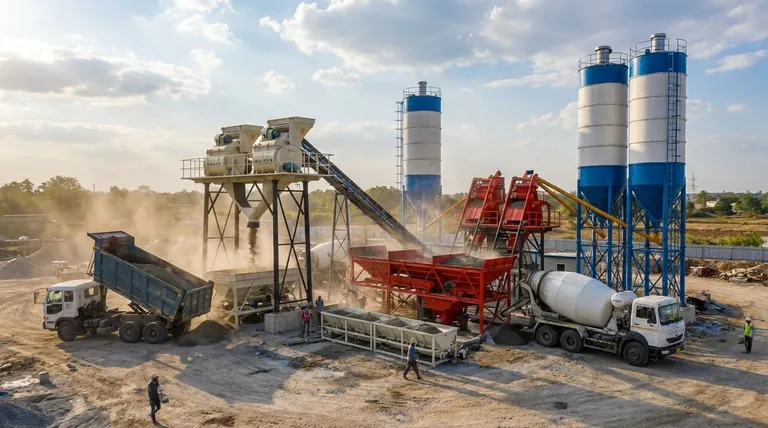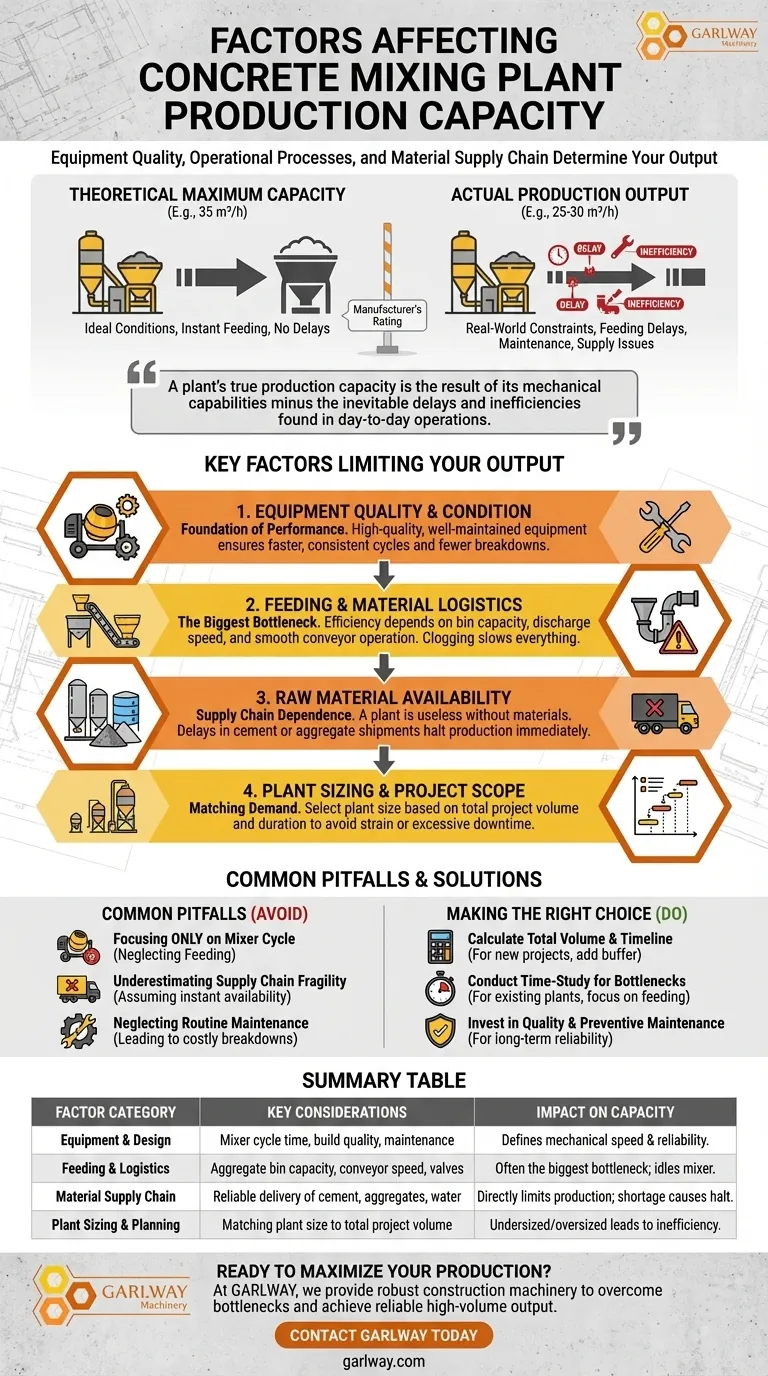At its core, a concrete mixing plant's production capacity is determined by three primary areas: the quality and design of the equipment, the efficiency of your operational processes, and the reliability of your raw material supply chain. The manufacturer's stated capacity is a theoretical maximum, while your actual output is dictated by these real-world constraints.
A plant's true production capacity is not the number on the specification sheet. It is the result of its mechanical capabilities minus the inevitable delays and inefficiencies found in day-to-day operations, from material feeding to mixer cycle times.

Deconstructing Capacity: Theoretical vs. Actual
The most common point of confusion is the gap between a plant's advertised rating and what it produces in a working day. Understanding this difference is the first step to mastering your production.
The Manufacturer's Rating (Theoretical Maximum)
The theoretical capacity, often stated in cubic meters per hour (e.g., 35 m³/h), represents the plant's output under perfect, non-stop conditions. This number assumes instant material feeding, perfect mixing cycles, and immediate discharge with zero delays between batches.
The Real-World Output (Actual Production)
In practice, actual output is always lower. A plant rated for 35 m³/h might realistically produce 25 to 30 m³/h. This reduction is caused by the small but cumulative delays in every single step of the production cycle.
Key Factors That Limit Your Plant's Output
Your daily production volume is a direct result of how well you manage the bottlenecks within your system. These factors are the most common and impactful.
Equipment Quality and Condition
The build quality of the plant is foundational. High-quality equipment from reputable manufacturers provides more reliable performance and faster, more consistent cycle times. Poorly maintained or lower-grade machinery is prone to breakdowns and slower operation, directly reducing output.
Feeding and Material Logistics
How quickly you can get raw materials into the mixer is often the biggest bottleneck. The efficiency of this feeding stage depends on the capacity of storage bins, the discharge speed of aggregates, and the smooth operation of all valves and conveyors. Clogging, valve malfunctions, or poorly angled feeders can significantly slow down the entire process.
Raw Material Availability
A mixing plant is useless if it's starved of materials. Your production capacity is directly tied to your supply chain. A delay in a shipment of cement or a shortage of the correct aggregate will bring production to a halt, regardless of your plant's mechanical potential.
Plant Sizing and Project Scope
Selecting the right size plant is crucial for efficiency. The choice should be based on the total volume of concrete required for the project's duration. For example, a project needing 400,000 cubic meters over two years might require a 90-station plant to meet demand without constant strain or excessive downtime.
Understanding the Common Pitfalls
Avoiding common mistakes in planning and operation is just as important as optimizing the machinery itself.
Focusing Only on the Mixer
Many operators focus solely on the mixer's cycle time. However, if the feeding system can't keep up with the mixer, the mixer will sit idle, wasting potential capacity. The entire production line is only as fast as its slowest part.
Underestimating Supply Chain Fragility
The most common external cause of downtime is a failure in the material supply chain. Assuming that aggregates, cement, and water will always be available on demand is a critical error in planning for maximum capacity.
Neglecting Routine Maintenance
Preventive maintenance is not a cost; it is an investment in capacity. Skipping regular service leads to unexpected breakdowns, which cause far more production loss than scheduled downtime for maintenance ever would.
Making the Right Choice for Your Goal
Your approach should be tailored to whether you are planning a new project or optimizing an existing one.
- If your primary focus is selecting a new plant for a project: Calculate the total required concrete volume and the timeline, then work backward to determine the necessary actual daily output, adding a buffer for delays.
- If your primary focus is maximizing output from an existing plant: Conduct a time-study to identify your biggest bottleneck—it is most likely the material feeding stage or waiting on trucks.
- If your primary focus is long-term reliability: Invest in high-quality equipment from a trusted manufacturer and implement a strict preventive maintenance schedule.
By shifting your focus from theoretical ratings to the realities of your operation, you gain the power to accurately predict and control your concrete production.
Summary Table:
| Factor Category | Key Considerations | Impact on Capacity |
|---|---|---|
| Equipment & Design | Mixer cycle time, build quality, maintenance | Defines the mechanical speed and reliability of the plant. |
| Feeding & Logistics | Aggregate bin capacity, conveyor speed, valve operation | Often the biggest bottleneck; slow feeding idles the mixer. |
| Material Supply Chain | Reliable delivery of cement, aggregates, and water | Directly limits production; any shortage causes a complete halt. |
| Plant Sizing & Planning | Matching plant size to total project volume and timeline | An undersized or oversized plant leads to inefficiency and strain. |
Ready to maximize your concrete production capacity and ensure project success?
At GARLWAY, we specialize in providing robust and efficient construction machinery—including high-performance concrete batching plants, mixers, and winches—for construction companies and contractors worldwide. Our expertise helps you select the right equipment and optimize your operations to overcome bottlenecks and achieve reliable, high-volume output.
Contact GARLWAY today to discuss your project needs and discover how our solutions can drive your productivity and profitability.
Visual Guide

Related Products
- HZS35 Small Cement Concrete Mixing Batch Plant
- Construction Products Concrete Plant Machine Mixing Concrete Mixer
- Portable Concrete Mixer Machine Equipment for Mixing Concrete
- HZS75 Concrete Batching Plant Cement Mixer Price Concrete Mixer Bunnings Mixing Plant
- HZS180 Ready Mix Concrete Plant for Foundations with Sand and Cement
People Also Ask
- What is needed for a concrete plant? The Essential Components for Reliable Production
- What does liquid transportation in a concrete batching plant involve? Ensuring Precise Mix Quality and Consistency
- What are the common types of cylinder failures in concrete mixing stations? Diagnose & Prevent Costly Downtime
- How does a wet mix concrete plant operate? Unlock Superior Quality & Consistency
- How does operator skill level affect concrete batching plant choice? Match Your Team to the Right Machine
- How can the discharging time of a mixing station be reduced? Boost Plant Output by Breaking the Bottleneck
- Why is the measurement system of a concrete mixing plant important? Ensure Quality and Safety in Every Batch
- What technological advancements are present in modern concrete mixing plants? Achieve Unmatched Precision and Efficiency



















